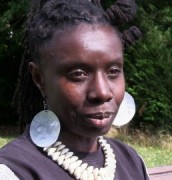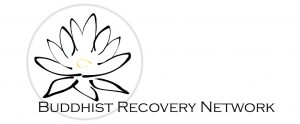Buddhist Recovery Around the World
Interview With a Teacher – Valerie Mason-John
By Debra Greenfield, Northwest Buddhist Recovery
 Valerie (Vimalasara) Mason-John is a vibrant and impassioned speaker, sharing her own path of spiritual growth and personal healing with grace, beauty and a poetic fervor. She is inspirational to watch, engaging the audience with her striking stage persona and elegant prose as she pulls you into her inspiring journey from suffering to equanimity. She is a playwright and author of seven books including Detox Your Heart – working with anger, fear and hatred (Epub and course published 2013) and the co-author of Eight Step Recovery – Using The Buddha’s Teachings to Overcome Addiction. She is also the author of The War Done Done – a new unpublished novel (publisher welcome).
Valerie (Vimalasara) Mason-John is a vibrant and impassioned speaker, sharing her own path of spiritual growth and personal healing with grace, beauty and a poetic fervor. She is inspirational to watch, engaging the audience with her striking stage persona and elegant prose as she pulls you into her inspiring journey from suffering to equanimity. She is a playwright and author of seven books including Detox Your Heart – working with anger, fear and hatred (Epub and course published 2013) and the co-author of Eight Step Recovery – Using The Buddha’s Teachings to Overcome Addiction. She is also the author of The War Done Done – a new unpublished novel (publisher welcome).
Q. Many people discover Buddhist teachings as they work their recovery program, others develop an awareness of their addictive behaviors on their journey on the Buddhist path. When did you discover the advantages to integrating your Buddhist and recovery paths and what did your own journey look like?
For as long as I can remember I always wanted to learn to meditate. At the age of 15 I was locked up in a youth prison for shop lifting. I lost a lot of time, and ended up in solitary confinement for many weeks at a time. It was there I must have learned unconsciously to meditate. I had touched on altered states, and tried very much to find it when I was released aged 17. I found it on the dance floors when I was clean and sober, but I also thought I found it when I was intoxicated with acid or cocaine, or any other upper I could take. A friend took me along to a transcendental meditation teacher, and after one sit I knew I had found what I was looking for, a natural high (and I didn’t have to pay for it!) . But at the same time I knew it was a therapy for me.
My root addiction is sugar. Yes, I drank socially, but I could take it or leave it. Uppers were different I was a functioning addict, but refined sugar is my disease. At the peak of my disease I was bingeing and purging over 40 times a day. I used other intoxicants to give me respite. I could not stop, I did not know how to stop. I lived in the hell of that addiction from the age of 17 to 37.
I went on my first retreat at age 28 and experienced abstinence of more than one day for the first time. I began going on retreats for respite. While I had moments of a sober mind, abstinence was most definitely an issue. Without abstinence there was no chance of sobriety of mind.
Once upon a time my black identity, my queer identity, my bulimia Nervosa were at the center of my life. These were false refuges because they brought about suffering. I bring this part of my personal practice to people in recovery. I ask them to reflect on what they spend most of their time thinking about, what is at the center of their life. Of course I don’t say “you must have the three jewels!” but that they do need something positive, whether a “God of their understanding” or some other spiritual ideals. When we can see the impermanence of everything, we can accept the unsatisfactory nature of life. We can see that the person we think we are is an illusion based on our thinking, or based on other people’s thinking. In essence when we can see there is no self to hate, blame or berate, that all we are is a flow of conditions arising and ceasing, then this is sobriety of mind; peace from the mayhem that can whir inside our heads.
Q. What inspired you to write your new book ”Eight Step Recovery – Using the Buddha’s Teachings to Overcome Addiction”. What can you share about the book and your downloadable “21 Day Meditations for Recovery” with our community here in the Pacific Northwest as to how it can help to ease the “dis-ease” of our recovery paths?
There is more than one way to recovery, 12 steps is not the only way and I am proof of that. My co- author is a psychiatrist specializing in addiction who treats people who are suicidal, They have been led to believe if they can’t get clean in the 12 step rooms they are doomed and there is no hope. This is a tragedy. Both of us through our own insights into Buddhist teachings wanted to mark clearly a Buddhist pathway to recovery that could be used by anyone. We want to put the Buddhism back into the mindfulness practices. Mindfulness is not enough for the addict to maintain abstinence and develop sobriety of mind.
The Buddha was in recovery. He went beyond recovery when he woke up to seeing things as they really are. The Buddhist teachings guide us to see things as they really are, offering us a way out of suffering. Addiction is suffering and at the root of it is craving and aversion, which are two of the poisons the teachings talk about.
We have delivered training to professionals working in the field of addiction, and inevitably some of them are 12 step or SMART recovery members. The feedback has been inspiring. They have always known that what I call “stinking thinking” has been the cause of a relapse, but have never had it explained in a way that they can see how that actually plays out in the mind We also help them to see the importance of Buddhist loving-kindness (metta) practices.
See Also
An informative interview aired on Canada’s “Talk Recovery Radio”, discussing Buddhism, meditation and their relation to addiction awareness and recovery.
Interview with Valerie Mason John, co-author of eight step recovery


